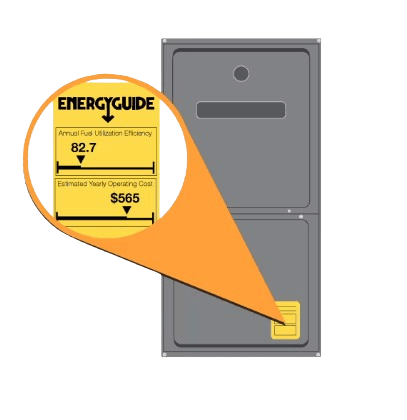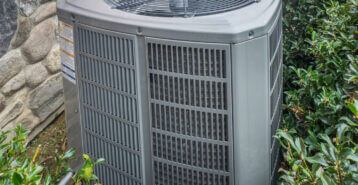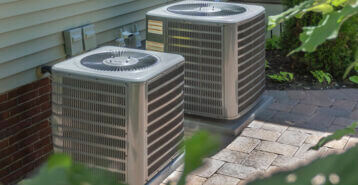Are you doing an HVAC project?
Modernize can pair you with three to four pros in your area, so you can compare options and save time and money.
- Want to Save on Utilities? Consider Your Furnace’s Efficiency Rating
- What Is an AFUE Rating?
- Types of Furnaces by AFUE Rating
- Which Furnace Efficiency Does Your Home Need?
- Why Does AFUE Matter? Because of How Much You Save
- Choosing the Best HVAC System for Your Home
- Other Factors to Consider When Buying a Furnace
- Furnace & Utility Cost Breakdown by AFUE Rating
- Pros and Cons of High-Efficiency vs. Standard-Efficiency Furnaces
- Final AFUE Takeaway
- Frequently Asked Questions About AFUE Ratings
Want to Save on Utilities? Consider Your Furnace’s Efficiency Rating
One of the most effective ways to reduce heating costs is by upgrading to a high-efficiency furnace. Not only do these furnaces run more quietly and reliably, but they can also cut winter energy bills by up to 40% to 45% compared to older, inefficient units.
This guide from Modernize explains what AFUE ratings are, why they matter, and how to use them to choose the right furnace for your home.
What Is an AFUE Rating?
AFUE stands for Annual Fuel Utilization Efficiency. It’s the Department of Energy’s (DOE) standard measure of how efficiently a furnace converts fuel into heat for your home. Or, if you need another way to think about it, how much heat you’re paying for that never actually makes it into your house.
Think of AFUE like a car’s miles-per-gallon (MPG) rating: it tells you how much heat output you get from every unit of fuel consumed. Let’s look at a couple examples:
- 80% AFUE: For every $1 spent on fuel, $0.80 goes toward heating your home while $0.20 is lost through exhaust and inefficiency.
- 95% AFUE: For every $1 spent, $0.95 heats your home and only $0.05 is wasted.
Current AFUE Standards
- The federal minimum AFUE for new residential furnaces is 80%.
- High-efficiency furnaces range from 90% to 98% AFUE, with ENERGY STAR® models typically starting at 95%.
- Furnaces manufactured before 1992 may not have an AFUE rating at all and often operate at 60% to 70% efficiency, making them prime candidates for replacement.
You can find your furnace’s AFUE rating on the yellow EnergyGuide label or in your system’s manual.
Types of Furnaces by AFUE Rating
Furnaces are generally grouped into three categories based on their efficiency:
- Standard Efficiency (80 to 85% AFUE): Single-stage furnaces; lowest upfront cost but highest long-term fuel use.
- Mid to High Efficiency (90 to 94% AFUE): Often two-stage furnaces; balance of cost and performance.
- High Efficiency / Condensing (95 to 98% AFUE): Variable-speed or modulating furnaces; best efficiency, lowest operating cost.
Which Furnace Efficiency Does Your Home Need?
- High-Efficiency (95 to 98% AFUE): Best for cold climates and homeowners planning to stay in their home long-term. The higher upfront cost is offset by major utility savings and comfort.
- Mid-Efficiency (90 to 94% AFUE): Best for mixed climates or homeowners who want a balance between upfront investment and ongoing savings.
- Standard Efficiency (80 to 85% AFUE): Best for mild climates or homeowners looking for the lowest upfront cost, though monthly utility bills will be higher over time.
If you’re looking for specific brand and unit recommendations, you can check out Modernize’s guide to the best furnace brands.
Find the Right Contractor for Your HVAC Project
Whether you’re ready to begin your project now or need some expert advice, our network of contractors are here to help. With a few simple questions, we’ll find the best local professionals for you
Why Does AFUE Matter? Because of How Much You Save
The difference between an 80% furnace and a 95% furnace adds up to hundreds of dollars in annual energy costs. Over the 15 to 20 year lifespan of a furnace, that savings can reach several thousand dollars.
- Colder climates benefit most from higher AFUE ratings, since furnaces run more often.
- Milder climates may see slower payback but still gain reliability, quieter operation, and better warranties with modern units.
High-efficiency furnace models cost more upfront but save on utilities.
Choosing the Best HVAC System for Your Home
AFUE is a critical factor, but it’s not the only one. The right system depends on your home size, climate, and budget. Below are the main HVAC system types:
- Split System: Most common setup, with an outdoor AC and indoor furnace.
- Hybrid/Dual-Fuel System: Combines an electric heat pump with a gas furnace for energy savings.
- Ductless System: Ideal for homes without ductwork; uses an outdoor unit and indoor air handlers.
- Packaged System: All-in-one system, often used in smaller homes or limited-space installations.
Other Factors to Consider When Buying a Furnace
- Capacity (BTUs): Ensure the furnace is properly sized for your square footage. Oversized or undersized systems waste energy and reduce comfort.
- Cost: Expect to pay $4,500 to $9,500 installed for most furnaces. To get your own ballpark estimate, you can read our guide to furnace replacement cost or use Modernize’s HVAC cost calculator.
- Maintenance: Annual tune-ups improve performance and extend lifespan.
- Warranty: Look for at least a 10-year parts warranty and a lifetime heat exchanger warranty on premium models.
Furnace & Utility Cost Breakdown by AFUE Rating
| AFUE Rating | Efficiency Category | Typical Installed Cost | Average Monthly Utility Cost* |
|---|---|---|---|
| 80 to 85% | Standard | $4,000 to $6,500 | $140 to $220 |
| 90 to 94% | Mid-High | $5,000 to $8,000 | $120 to $180 |
| 95 to 98% | High-Efficiency | $6,500 to $9,500+ | $90 to $150 |
*Utility costs assume a 2,000 sq. ft. home in a cold climate with average U.S. natural gas rates.
Pros and Cons of High-Efficiency vs. Standard-Efficiency Furnaces
| Furnace Type | Pros | Cons |
|---|---|---|
| High-Efficiency (95 to 98% AFUE) | • Lower monthly energy bills | • Higher upfront cost |
| • Quieter operation with variable-speed technology | • More complex installation | |
| • Strong warranties and long-term reliability | • Payback period may be longer in mild climates | |
| Mid-Efficiency (90 to 94% AFUE) | • Balance of cost and performance | • Still pricier than standard units |
| • Often two-stage operation for comfort | • May not qualify for all rebates | |
| • Better energy savings than standard models | ||
| Standard Efficiency (80 to 85% AFUE) | • Lowest upfront cost | • Higher monthly utility bills |
| • Widely available | • No ENERGY STAR® qualification | |
| • Easier installation and fewer components | • Less efficient in colder climates |
Final AFUE Takeaway
AFUE ratings are the simplest way to compare furnace efficiency and long-term operating costs. If your system is older than 15 years or has an AFUE below 80%, upgrading to a high-efficiency furnace can lower your energy bills, increase comfort, and provide better peace of mind.
When you’re ready, connect with a licensed HVAC contractor to evaluate your home’s needs, compare quotes, and choose the best system for your budget.
Frequently Asked Questions About AFUE Ratings
Find the Right Contractor for Your HVAC Project
Whether you’re ready to begin your project now or need some expert advice, our network of contractors are here to help. With a few simple questions, we’ll find the best local professionals for you
Reviews from Real Homeowners
Welcome to Homeowner Resources! We are the Modernize blog. Modernize pairs more than 3 million homeowners a year with pre-vetted contractors in their area. This blog started because we believe homeowners should know everything about their homes, from how their HVAC works to which front door colors they might love. On Homeowner Resources, you can find information on every part of your home, right down to how you can negotiate with contractors to get the best price. Here's more about the blog.
Need a contractor? Learn more about how Modernize finds the right pro for you.





